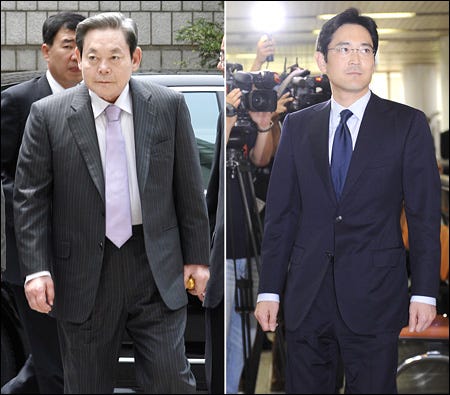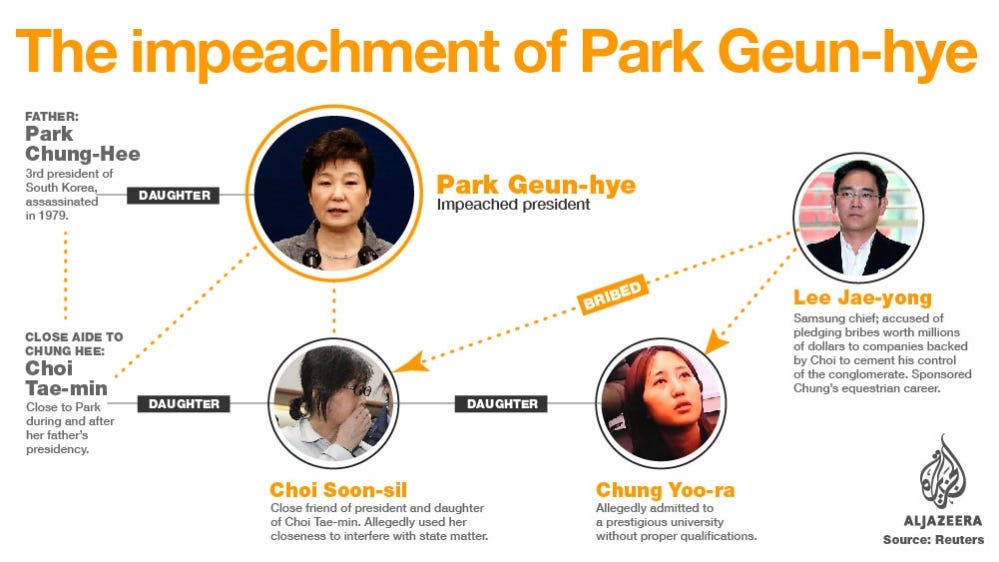Platforms Enable Competition by Default & The Curious Case of Lee Kun-hee
In this week's issue, we look at how existing platforms are enabling competition through their advertising-focused business models. Next, we turn to South Korean inheritance taxes to explain why Samsung may have been keeping its chairmans death a secret for the last 6 years.
Platforms Enable Competition by Default (1 min)
The Curious Case of Lee Kun-hee (2 min)
How have existing social media platforms contributed to the rise of TikTok and what does this phenomenon mean for competition?
TikTok's meteoric growth is in large part because it was able to leverage existing platforms to drive its user growth. It spent $1 billion in 2018 to acquire users (that's more than $3 million a day in the U.S. alone). Initially, it focused on acquiring users through Facebook ads where Reuters reports that, “nearly 22% of all ads seen by U.S. Apple device users on Facebook's ad network came from TikTok".
Later TikTok shifted its focus to Snapchat, and over 80% of TikTok's 2019 ad spend was concentrated on Snapchat ads. It was able to leapfrog Snapchat and now boasts more U.S. DAU's (daily active users) than the platform it found the most success acquiring users from (while also being Snapchat's biggest advertiser for the year).
There is no doubt that TikTok has an amazing product and deserves to be a top tier social network. But what it has proven is that any platform that can stomach billions in ad spend no longer has to worry about distribution. When Facebook was scaling its platform it had to rely on real-world network effects, referrals, and traditional marketing techniques. There was no way for it to pay some marginal cost to MySpace to capture some percentage of their userbase. This made growth much harder and a longer process than what TikTok has been able to do.
By being able to advertise to any platform's users, the current crop of social media companies has become the next generation of products go-to source for new customers, ensuring that competition is always just one ad unit away.
In Other Words
In today's world, Facebook, Instagram, Snapchat, (and soon TikTok itself) provide a ready-made path for any upcoming platform to gain immense scale. When we talk about the fact that our social media platforms are too big or have monopolistic tendencies, the fact that well-capitalized companies can take advantage of that size for their own benefit (because of existing platforms reliance on advertising) is often brushed aside.
Why does South Korea have a 50% inheritance tax and what are its effects on its economy?
South Korea has one of the most concentrated economies of the developed world with 5 companies accounting for over 70% of the economy in the country. The largest of the 5 "Chaebol" companies (as they are called in South Korea) is Samsung which comprises just over 20% of the entire South Korean stock exchange.
The government has the unenviable task of trying to make the Chaebol slowly loosen their grip on the economy while ensuring that doing so doesn't send the economy into a tailspin. In theory, South Korea's high inheritance tax is a great mechanism to help encourage this. In practice, the Chaebol have worked in tandem with the government to ensure that their sons and daughters remain in control of the companies that they founded.
Until last week Samsung was controlled by a second-generation founder, Lee Kun-hee. Lee's status as chairman of one of the most important pillars of the South Korean economy led to two separate pardons in corruption cases against him (in 2000 and 2009). Public outrage at these leaders being above the law has led to an upsurge of resentment against them and made it politically toxic to be seen as in league with them.
Lee Kun-hee has not appeared in public since 2014 when he had a heart attack and was reportedly put on life support. Immediately after, Lee Jae-Yong (Lee's son and successor) was forced to come up with a strategy to maintain control of Samsung's byzantine structure of inter-linked companies (spanning electronics, food processing, textiles, insurance, securities, and retail) while still being able to pay a reported $9 billion tax bill. His actions included allegedly bribing a close confidant of the South Korean president at the time (which resulted in her impeachment and removal from power and his ongoing corruption trial).
What's clear from this example is that by targeting the Chaebol through such an indirect measure (inheritance taxes), the South Korean government has failed to bring about a reduction in the power of its economic giants. Instead, the tax has served to exacerbate political discontent because the Chaebol have been caught repeatedly trying to skirt the rule through any means necessary. It seems that if one wants to reduce the power of such companies that perhaps more direct methods are necessary.
In Other Words
South Korea has the second-highest inheritance tax in the world and it was designed to wrest control of the economy away from the powerful Chaebol conglomerates which together account for 70% of the countries GDP. Fearful of the chaos such a split could bring, previous administrations have repeatedly pardoned or colluded with Chaebol leaders to ensure that succession runs smoothly. The previous chairman of Samsung has been rumored to be dead for the last 6 years but his death was only recently announced (presumably because his son was able to find a way to both pay the tax bill and maintain control of the company, once again showing that the inheritance tax is not serving its original aim).
How satisfied were you with this week's issue?
Let me know what you think in this 3 question survey
That’s all for this week. Thanks for making it this far and I hope you found these answers as interesting to read as I found them interesting to write. If you liked what you read, feel free to like, comment, or share it with someone who you think will enjoy it.
As always,
Roosh → You









